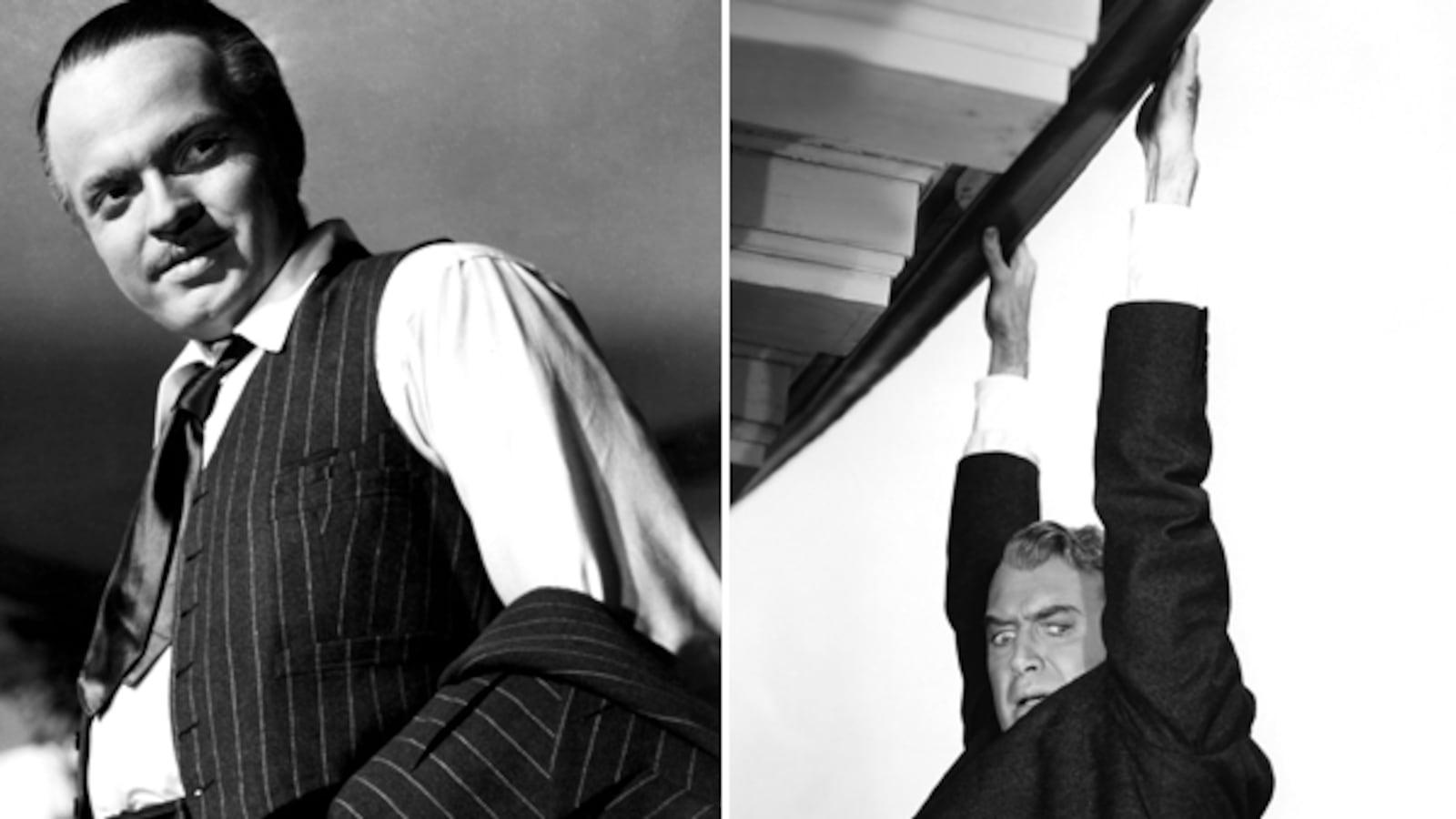Over the past few years, the world has marveled at the Internet’s powerful ability to bring despots and the mighty to their knees by giving voice to the masses. But today, the Internet did the unthinkable, shaking up the modern world’s most remote and impenetrable of preserves: the exclusive enclave of film criticism.
For 50 years, once a decade, the British Film Institute’s publication Sight and Sound has polled the world’s top film critics, and each time, they have ratified the status of Orson Welles’s Citizen Kane as “the greatest of film of all time.” However, the film world awoke Wednesday to find its foundations shaken and a new king sitting on the throne. When the votes were tallied, Vertigo stood as the world’s new Greatest Film of All Time.
Since it 1958 release, the reputation of Alfred Hitchcock’s psycho-thriller has held steady at or near the upper ranks of film appreciation. (It came in second in the 2002 poll.) With its complex and psychologically subversive themes, its role-of-a-lifetime performances from stars Jimmy Stewart and Kim Novak, and its dazzling, inventive cinematography, Vertigo has given film aficionados plenty to sink their teeth into over the years. It is not everybody’s favorite Hitchcock film—lacking the sheer thrill ride of some of the others—but you’d have to travel far to meet a film scholar who doesn’t at least respect it.
Meanwhile, for the same 50 years, venerable, venerated Citizen Kane has topped every list like a Third World President for Life; its greatness has been unquestionable by any but the most suicidal subversives.
The last Sight and Sound poll was conducted in 2002, when the blogosphere was still in diapers. Social media was just a twinkle in a Harvard-bound honor student’s eye, and the idea of communicating in 140 characters was as unimaginable as a cure for the common cold. Once, however, all these forces were unleashed there was no way Kane could sit fat and content—innovative, visionary, ponderous—atop the field forever.
Before the Internet, the only people authorized to have opinions about films were the full-time critics of America’s newspapers, magazines, and sometimes television networks. If you were not on the payroll of one of these institutions and you had thoughts about movies, you could share them with your friends, or you could dig into your pocket to fund the printing of a ‘zine where your thoughts might be read by a few hundred people. If you were really lucky, you were the teacher of a film studies class at a high school or college so you could make your students listen to your opinions. As of the mid-to-late 90s, maybe you found a nice message board with a few dozen people to talk to. But beyond that, your ideas about movies were yours to keep to yourself. And then blogs arose, and a new wave of self-appointed critics appeared. People on the payroll of non-traditional media companies were paid for their thoughts, without “editorial supervision.”

Anyone who could support themselves by selling a few ads was entitled to have an opinion. Or even anyone who just had the energy to keep a blog going and attract a handful of readers. And then came Twitter, and one didn’t even need to have that energy. If you could say, “OMFG Awesome!” you were a critic, with the same access to a world of readers as the chief film critic of The New York Times.
But this new wave of critics was not going to be content to have the terms of greatness dictated to them from above. And as the conversation evolved in what has become the Backlash Era—a time of furious negative reaction to anything seemingly hyped or imposed—stately Kane was doomed. In the run up to the poll, dissenting voices spoke up online, saying you know, this Kane fellow…he’s a bit of a windbag isn’t he? Wears his big themes right out there on the sleeve, don’t you think? Suddenly, the film’s signature use of deep focus and its meditation on the corruption of media no longer made it the iron giant it once seemed. (The fact that the professional critics had time after time decided that the best film in history was a film about an evil media boss should not go unremarked.) Meanwhile, Vertigo sat there, tailor made to the role of Internet darling: quirky, subversive, surreal, and outlandish.
And so, the Kane regime has come toppling down.
Here, just announced Wednesday, is the new Sight and Sound Top 10 (out of 50) films of all time:
1. Vertigo2. Citizen Kane3. Tokyo Story4. La Règle du jeu5. Sunrise: A Song of Two Humans6. 2001: A Space Odyssey7. The Searchers8. Man With a Movie Camera9. The Passion of Joan of Arc10. 8 ½
What is fascinating, however, and proves even more deeply the power of the Backlash Era, is that the 846 people participating in this poll are not mere Twitterati, but remain the stalwart critics, academics, and movie programmers. The very same people who for 50 years have put Kane at the top of their lists have felt the breath of the crowd on the back of their necks. Like the military regime taking the initiative to remove Mubarak before they themselves were wrested from power, the critics have attempted to get ahead of the mob.
But this change only demonstrates how the job of professional critics has switched in the Backlash Era. No longer are the mavens of establishment journalism here to dictate to the people, but now, they serve to reflect the people’s will. It has been noted how often these days critics seem afraid to pan films destined to rule the box office. Many saw in the salivating raves given to Marvel’s otherwise workaday superhero film The Avengers a desire not to tangle with the mob.
Now that fear of the mob has ascended to the most venerable circle of criticism. It is not insignificant that Sight and Sound chose to reveal the results of the poll not as has been customary for the better part of a century, in their August issue, but on their Twitter feed.
The question is for the newly crowned king: How long can anyone hope to hold the throne in this climate? This morning the crowd is crying hosannas for the stunning upset. By tomorrow, they’ll be saying, Vertigo? The best pic of all time? Really, critics? What seemed bold and inventive today will suddenly be tawdry and not all that special by the now impossible standards of Greatest Film of All Time. It was a big climb for Vertigo to reach the pinnacle of filmdom, but it may well find in the next 48 hours that in these times you can fall down a mountain a lot quicker than you can climb one.






